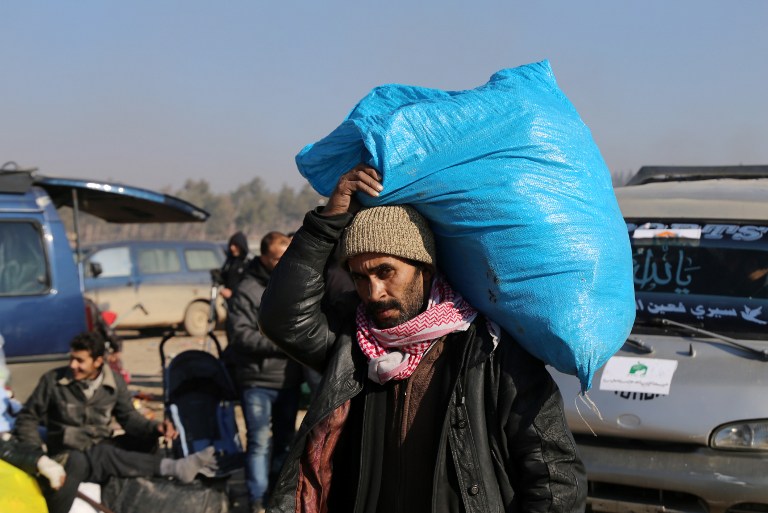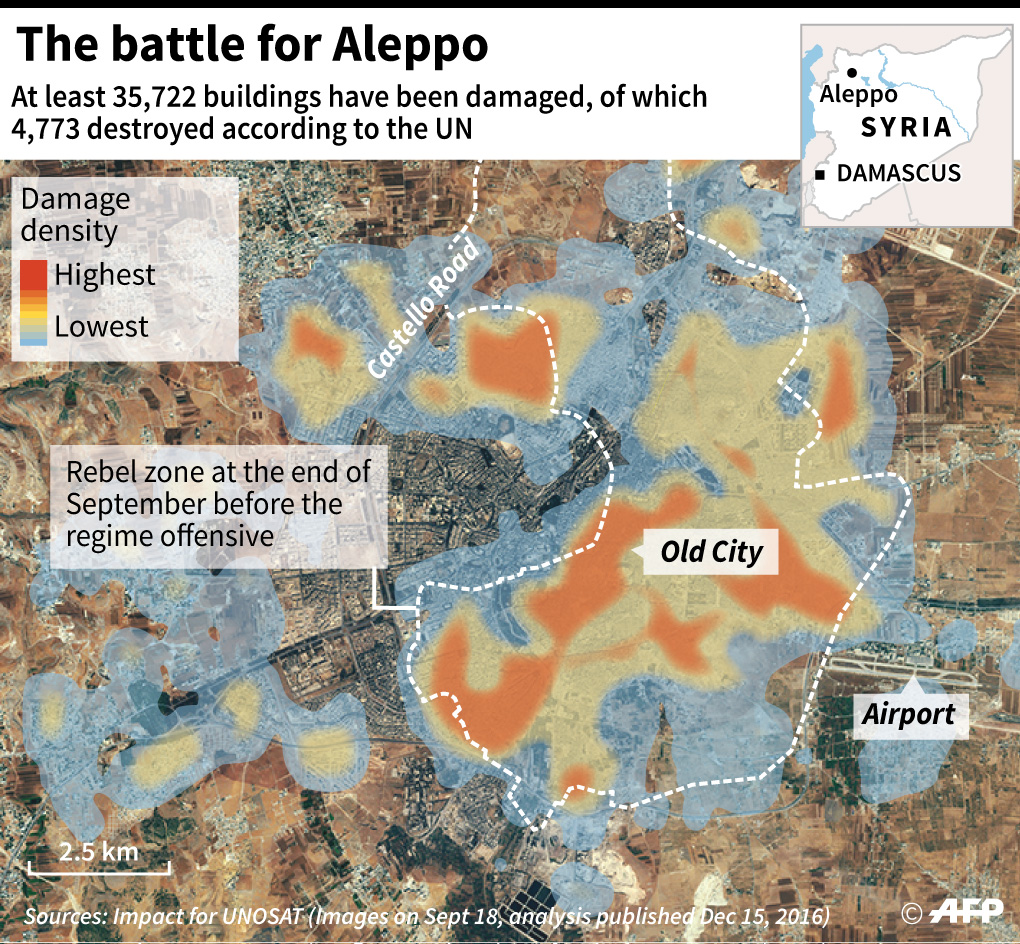
Gunmen attacked buses sent to evacuate people from two pro-regime villages in northwest Syria on December 18, 2016 but a senior military source said the incident should not disrupt parallel evacuations from Aleppo. Thousands of people were to leave the last rebel-held parts of the northern city of Aleppo in exchange for residents leaving Fuaa and Kafraya, Shiite villages, in the neighbouring province of Idlib. According to the Syrian Observatory for Human Rights, around 500 people left in a dawn convoy out of Fuaa and Kafraya on December 19, 2016. / AFP PHOTO / Baraa Al-Halabi
by Karam al-Masri with Maya Gebeily in Beirut
Agence France-Presse
ALEPPO, Syria (AFP ) – Thousands of traumatised Syrians left the rebel enclave of Aleppo on Monday under a complex evacuation agreement that will see regime forces exert full control over the battered city.
Families had spent hours waiting in below-freezing temperatures, sheltering from the rain in bombed-out apartment blocks and waiting desperately for news on a new wave of departures.
The operations resumed on Monday, with around 5,000 people travelling in 75 buses out of Aleppo, said Ingy Sedky, spokeswoman for the International Committee of the Red Cross.
They crossed the front line headed for rebel-held territory elsewhere in northern Syria, after around 350 other people got out during the night.
“We will continue throughout the day — and however long it takes — to evacuate the thousands more who are still waiting,” Sedky told AFP.
They were the first departures since Friday when the government suspended evacuations, insisting that people also be allowed to leave two northwestern villages under rebel siege.
According to the Syrian Observatory for Human Rights, around 500 people left in a dawn convoy out of Fuaa and Kafraya.
A medic said the latest evacuees from Aleppo were in a “terrible state” after their departure was delayed for hours in temperatures well below freezing, compounding their plight from months of siege and bombardment by the army.
Ahmad al-Dbis, who heads a team of doctors and volunteers coordinating evacuations, saw dozens of buses arrive at the staging ground west of Aleppo.
He said they were in “a very bad state after waiting for more than 16 hours” at a regime checkpoint without being allowed off the buses.
“They hadn’t eaten, they had nothing to drink, the children had caught colds, they were not even able to go to the toilet,” Dbis said.

Evacuees ‘been through hell’
Dbis described families wrapped in several layers of coats getting off the buses, which then headed back to Aleppo in readiness to bring out more.
A young boy bit into an apple as aid workers distributed bottled water to his family.
Among the evacuees was seven-year-old Bana al-Abed, whose Twitter account had offered a tragic account of Syria’s nearly six-year war.
The Humanitarian Relief Foundation (IHH), a Turkish NGO working in Syria, said that Bana was likely to be transferred to a displacement camp in the northwest province of Idlib.
“The people we are welcoming have been through hell — the level of trauma they have experienced is impossible to describe or comprehend,” said Casey Harrity of the international NGO Mercy Corps.
Residents of east Aleppo — a rebel bastion since 2012 — had lived under four months of suffocating siege when Syria’s army began its blistering assault in mid-November to retake the whole city.
In an 11th-hour deal, regime ally Moscow and rebel supporter Ankara agreed on the evacuation of thousands of civilians and fighters from the last remaining opposition-held pocket in Aleppo.
Around 8,500 people left the eastern districts on the first day of evacuations, but Syria’s government suspended operations on Friday.
The main obstacle to a resumption had been the dispute over how many people would be evacuated in parallel from Fuaa and Kafraya.
On Sunday, rebels attacked buses sent to bring people out of the two Shiite-majority villages, killing one of the drivers.
But the deal appeared to be back on Monday morning, with 10 buses leaving Fuaa and Kafraya almost simultaneously with those leaving Aleppo.
A rebel representative said that hundreds of people would also be evacuated from Zabadani and Madaya, two rebel towns near the Lebanese border under siege by the army, as part of the deal.
Moscow meeting
Iran’s official news agency IRNA said the foreign ministers of Russia, Turkey and Iran would meet in Moscow on Tuesday to discuss the situation.
Russia said on Monday that the defence ministers from the three countries would also be meeting in Moscow on Tuesday.
Moscow, which has carried out an air war in support of the Damascus regime since September last year, had threatened to veto a UN Security Council draft resolution calling for monitors to oversee the protection of civilians.
But after four hours of closed-door consultations on Sunday it gave the French-drafted text its guarded support.
US ambassador Samantha Power anticipated member states would approve it “unanimously” at 1400 GMT on Monday.
An AFP reporter visited a hospital where patients lay on floors with no food or water and with almost no heating.
A physiotherapist, Mahmud Zaazaa, said only “three doctors, a pharmacist and three nurses” remained in the rebel enclave.
An official said more than half of Aleppo’s buildings had been destroyed or seriously damaged since the rebels overran the east in summer 2012.
UN envoy Staffan de Mistura estimated that as of Thursday around 40,000 civilians and perhaps as many as 5,000 opposition fighters remained in Aleppo’s rebel enclave.








